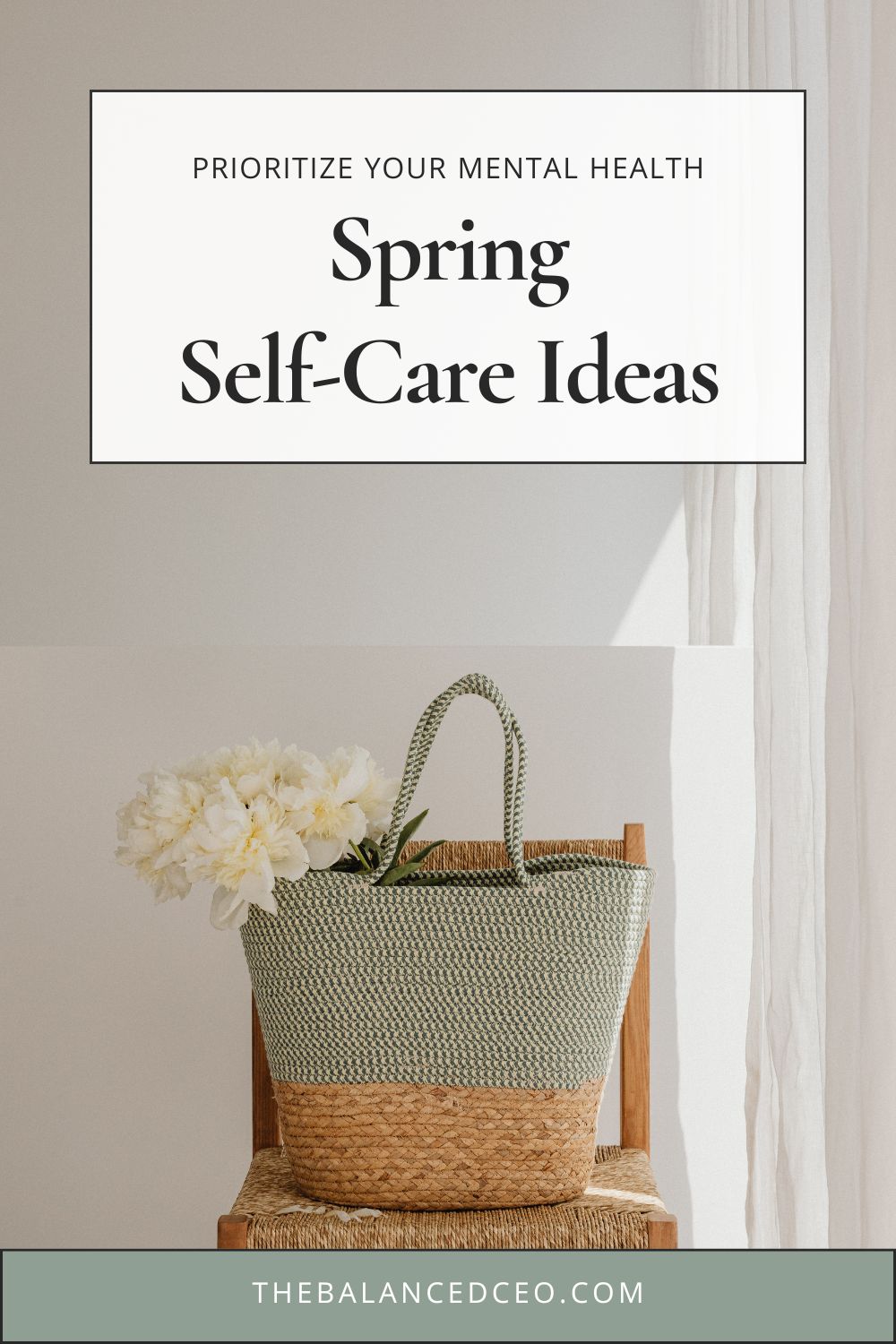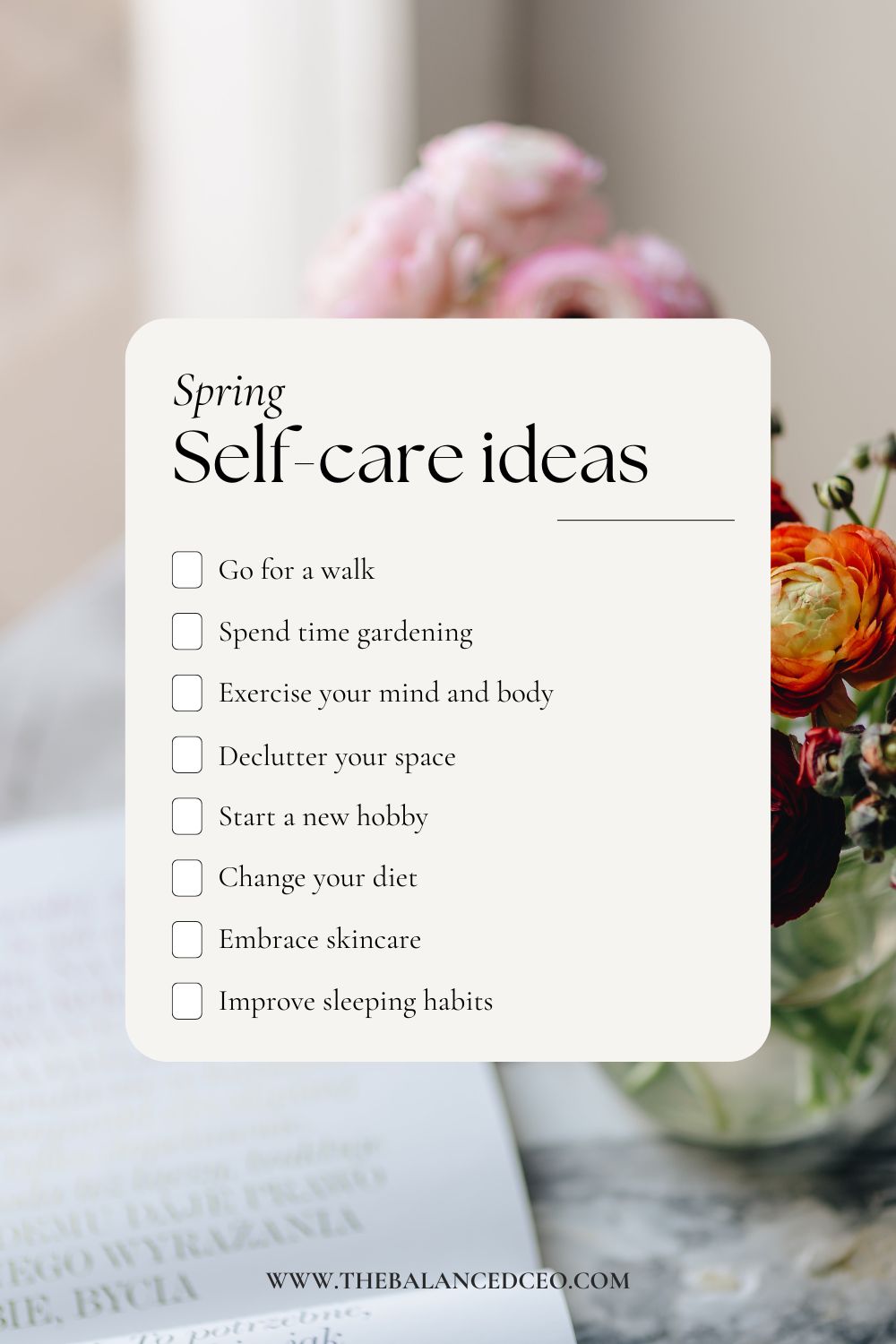This post may contain affiliate links, which means I’ll receive a commission if you purchase through my links, at no extra cost to you. Please read full disclosure for more information.

Although many look forward to blooming flowers and warm sunshine, coping with the changing seasons can be difficult. Self-care has never been more important for your mental health than the transition from winter to spring. Here’s how the rush of warmer weather can affect your outlook and ways to prioritize caring for your needs.
How Does Springtime Affect Your Mental Health?
Most people are aware of seasonal affective disorder (SAD) in the wintertime — depression occurring during the change of the seasons. However, surprisingly, moving into spring can also leave you feeling blue.
Clinical psychiatry professor Dr. Norman Rosenthal from Georgetown University Medical School describes spring’s dramatic shifts as erratic — one day is beautiful and warm, while the next is rainy, gray and cool. As a result, your body must learn to adjust physically and mentally.
Spring is often coupled with a desire to change — to move away, find a new career or leave a relationship — which can feel as unsettling as it is exciting. Your sleep habits may also need work, especially with daylight savings time.
8 Ways to Embrace Self-Care This Spring
If you’ve ever felt the pangs of spring, you’re not alone. It merely underscores the need to prioritize your mental health during the seasonal change. Reset your mind and body for warmer weather with these eight self-care tips.
1. Go for a Walk
Those who can’t or don’t want to join a gym can get a healthy dose of endorphins by walking. Research shows walking eases anxiety, boosts your mood and improves restlessness. Regardless of the slow-paced, cyclical aspect of this exercise form — making it an activity most can participate in — it exposes you to natural environments.
Only 120 minutes spent in nature weekly is associated with improved mental and physical well-being. Other findings indicate reduced stress and cortisol levels when you spend 20–30 minutes outside in urban areas.
2. Spend Time Gardening
If the running joke is you can’t keep plants alive, spring is the perfect time to prove everyone wrong. Gardening improves mental health outcomes by forcing you outdoors, promoting physical activity and providing opportunities to socialize. According to one study, 65% of participants who garden say it’s their favorite leisurely hobby, inducing calmness and satisfaction.
If you’re new to gardening, start small. A contained bed, flower pots or raised garden is ideal for growing a few plants. For full sun, ensure the location you choose receives at least six hours of sunlight daily, while plants requiring partial sun should receive four to six hours.
3. Exercise Your Body and Mind
Exercise benefits both your body and mind, especially when you combine it with meditation. While many of us listen to music or podcasts while we workout, try turning the distractions off. Focus on how your body feels as you move, and practice breathwork to help relax your mind.
Yoga is best known for combining exercise with meditation, but it’s not the only option. Swimming has been shown to improve your mood and reduce anxiety. Walking and running can also help you get into a meditative state. Leave your headphones at home and listen to your body the next time you hit the gym.
4. Declutter Your Space
A 2024 survey by the American Cleaning Institute found 80% of people engage in spring cleaning at least once annually. Another 62% said decluttering helps their mental and physical health.
Clean out your closets and drawers this spring as a form of self-care, but focus on one space at a time to avoid feeling overwhelmed. Sifting through your belongings and deciding what to keep allows you to reorganize them differently. Ultimately, you want your home to feel and look breathable, relaxing, and inviting.
For a more sustainable approach to decluttering, see what you can give a second life to, like turning old clothes into cleaning rags. Donate gently used items to people who need them.
Related Read: Spring Cleaning Ideas to Bring New Life to Your Home
5. Start a New Hobby
Spring is the perfect time to return to doing things you love or finding new hobbies. Is there a craft you’ve always wanted to try or have you wanted to hone your cooking skills? Set aside time in your busy schedule to prioritize exciting activities.
Yoga, fishing, water coloring, and photography are just a few of the many springtime hobbies you can participate in. Blooming flowers and sunnier days are ideal for photographing or painting landscapes. You can even bring your yoga mat to the patio for a nature-based meditative experience.
6. Change Your Diet
When the weather is cold, many people lean toward rich, creamy comfort foods to keep warm. However, by April, you may be eager to eat lighter fare. Embrace salads, freshly caught salmon, bright-green herbs, and organic fruits and vegetables.
Depending on the weather, you can light the grill before summer begins. Collect recipes you want to try and commit to healthier eating habits. You’ll feel better physically and mentally and benefit from renewed energy.
7. Embrace Skin Care
Adopting a skin care regimen this spring will help you eliminate the dry, flaky skin you had during the cold season. Purchase new products for your skin type, such as a gentle cleanser, exfoliant and moisturizer.
Topical skincare items with Vitamin E oil combat inflammation and redness, benefiting the skin cell barrier. If you spend more time outdoors, you should also apply SPF to your face and body. Ultraviolet rays can cause sunburns, skin damage and cancer if you’re not careful.
8. Improve Sleeping Habits
Experts recommend adults get seven hours of sleep each night, which you may find laughable if you have insomnia or poor sleeping habits. However, a restful night is essential for your mental health as the seasons change.
Create a new evening routine, including turning off electronics an hour before bed, exercising and eating dinner earlier, and avoiding drinking caffeine too late. Waking up and going to sleep at the same time every day is equally important to improving sleeping habits.
Step Into Spring With Positive Mental Health
Pay attention to your mental health as the seasons change. Although spring is a precursor to bright, sunny days and summer fun, the transition can weigh you down. Put your self-care needs first for a better mindset and mood.

Cora Gold
Contributor
Cora Gold is the Editor-in-Chief of Revivalist magazine, a publication dedicated to happy, healthy, and mindful living.






Leave a Reply